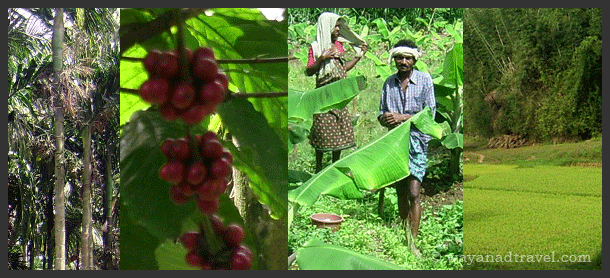This high altitude district is characterized by the cultivation of perennial plantation crops and spices. The major plantation crops include coffee, tea, pepper, cardamom and rubber. Coffee based farming system is a notable feature of Wayanad. Coffee is grown both as pure crop and as a mixed crop along with pepper. Pepper is grown largely along with coffee in the northeastern parts of the district (70.150 ha), especially in Pulpally and Mullankolly areas. Coffee in Wayanad (70,150) ha. shares 33.65 per cent of the total cropped area in the district and 78 per cent of the coffee area in the state. Other major crops are coconut (8826 ha.), Arecanut (5722ha), Tea (5728 ha.) and Rubber (2954 ha.)Vanilla cultivation in assuming importance in the district. Paddy is cultivated in 19308 hectares. The rice fields of Wayanad are in the valleys formed by hillocks and in majority of paddy lands, only a single crop is harvested. Ginger cultivation in Wayanad has also substantially increased in recent times and the ginger produced is mainly marketed in the form of green ginger. Homestead farming assumes importance in this district. The average size of holdings are 0.68ha. A variety of crops including annuals and perennials are grown in these small holdings. The crops include coconut, arecanut, pepper, vegetables, tuber crops, drumstick, papaya, etc.and fruit trees like mango and jack.
Wayanad has 25 agricultural units known as Krishi Bhavans. Each unit is under the charge of an Agricultural Officer and 2 or 3 Agricultural Assistants. There is also farm of the Tribal Development Department known as Cheengeri Extension Scheme,Ambalavayal and it is managed by the Agricultural Department. The office of the Agricultural Extension Schemes, Ambalavayal and it is managed by the Agricultural Department. The office of the Principal Agricultural Officer is located at Kalpetta which co-ordinates the schemes.

